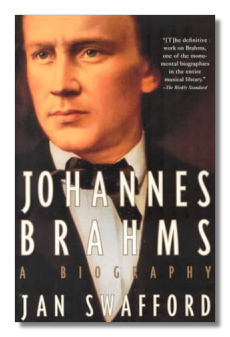
The Internet's Premier Classical Music Source
Related Links
-
Introduction
Acoustics
Ballet
Biographies
Chamber Music
Composers & Composition
Conducting
Criticism & Commentary
Discographies & CD Guides
Fiction
History
Humor
Illustrations & Photos
Instrumental
Lieder
Music Appreciation
Music Education
Music Industry
Music and the Mind
Opera
Orchestration
Reference Works
Scores
Thematic Indices
Theory & Analysis
Vocal Technique
Search Amazon
Recommended Links
Site News
 Book Review
Book Review
This is now the definitive biography of Johannes Brahms and one of the best I've read in any genre. Brahms is not an easy subject for a biographer because he destroyed most of his letters and working manuscripts to discourage biographers (belying H.L. Mencken's observation that Brahms wrote no bad notes: he did, but he burned them). Fortunately, Brahms was a public figure in his adopted Vienna, one of the music capitals of the world, so there are many secondary sources.
Johannes Brahms was of working class origins (Johnny Broom in English, Swafford reminds us). His father was a string bass player of moderate talent and his much older mother a seamstress. Both were devoted parents, but his father's poor financial management made life difficult, and the couple eventually broke up. Even so, Brahms remained loyal to his parents and did what he could to ease the difficulties faced by them and his siblings.
One of Swafford's most controversial contentions is that the Brahms' financial problems forced their teenage son to play piano in beer halls for sailors and prostitutes. This might help explain Brahms' misogyny (he never married) and his lifelong appetite for prostitutes. Despite the composer's fear of falling in love, he did so several times, even coming close to marriage on occasion. The love of his life was the great pianist Clara Schumann. Clara's husband, the great composer Robert Schumann, was a mentor and friend of Brahms and apparently too tied up by his increasing madness to worry about his wife and Brahms. In time, the complex, sometimes tumultuous (and probably unconsummated) relationship between Clara and Brahms cooled to friendship. To an extent, Clara was replaced by Elisabet von Herzogenberg a piano student whom Brahms had earlier passed on to a colleague because he was falling for her. Once she was safely married, Elisabet became one of Brahms' most loyal supporters and respected critics (and she was not not the only woman who occasionally served as his muse).
Because Swafford is a composer himself, he is able to provide some real insight into Brahms' music and the problems he had writing some (but not all) of it. Brahms' genius was discovered early in life, but the shadow of Beethoven made him insecure enough to postpone his first symphony until his forties and limit his string quartet output (after considerable struggle) to three. His Requiem required a few performances before it emerged in its final form. As a contemporary of Richard Wagner, he felt the need to write an opera but was never able to produce one.
Swafford's biography is as much an account of the composer's period and surroundings as the man himself. This makes the volume especially valuable and enjoyable, given that Brahms lived most of his life in one of the centers of Western music. Beyond the material on the Schumanns (almost a biography within a biography), it teems with characters like composer Antonín Dvořák, violinist Josef Joachim, conductor Hans von Bulow, critic Eduard Hanslick, and a plethora of amateur and professional musicians, teachers, critics, and society figures. Swafford takes us from Brahms' conducting job with a female choir, his work as a pianist and conductor, his struggles with publishers, his temper outbursts that cost him the friendship of Joachim and others, and much more.
Swafford accomplishes all this with the skill of an epic novelist. His writing flows, engages, and produces the same golden aura that Brahms cast about his music. So effectively does he immerse us into time, place, and events, that I occasionally had to look up to reorient myself to my own surroundings. If someone told me the author had actually shared "dumplings and smoked meat" with Brahms at the Zum roten Igel, I might just believe it.
Copyright © 2008 by Roger Hecht.



















